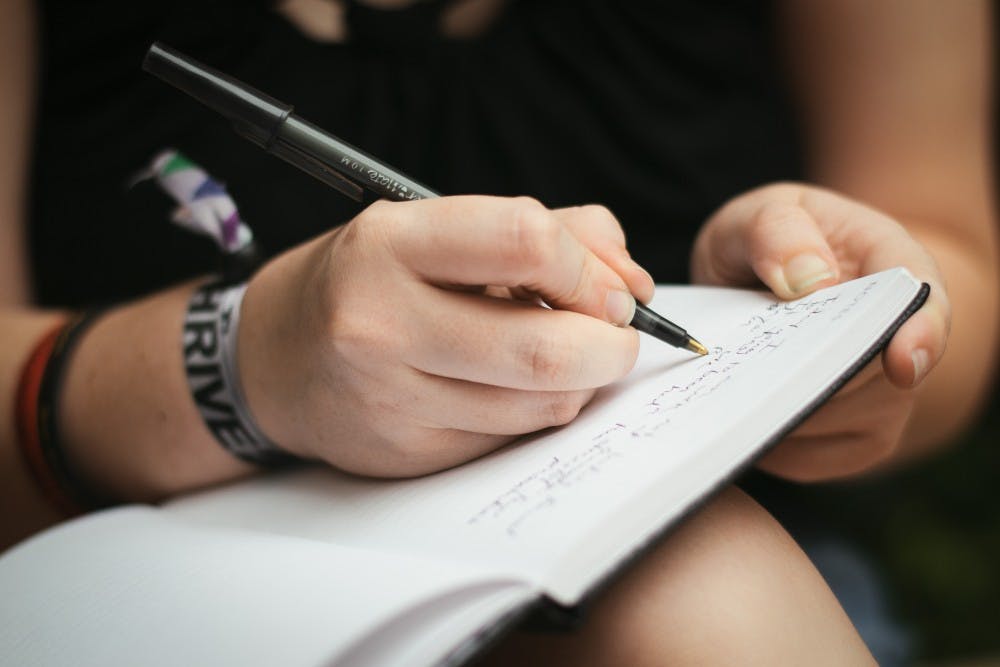While traditional ideas of journaling conjure images of composition notebooks filled with pages of "Dear diary," one ASU student aims to show how journaling can encompass a wide range of experiences.
In a performance piece she's presenting at The Empty Space, senior Joley Hamilton will explore the art of journaling and how it can help people get in touch with their minds, bodies and souls.
Hamilton, who's majoring in supply chain management, said that journaling comes in many forms, whether it be through the act of writing thoughts on pages or uploading a post on a fake Instagram, aka finsta.
The solo show, titled Sent with Love, will be a performance piece incorporating mixed-media elements like photographs and videos.
Sent With Love starts at 7:30 p.m. at The Empty Space on April 19. Hamilton said she hopes people will step out of their comfort zone to attend the performance and that everyone can take something away from her work.
Hamilton said the idea for the project evolved as a result of her experience creating a finsta account about a year ago, which she said opened up a different side of her that she hadn't been comfortable sharing before.
Read more: Finstas are the new Rinstas
"It was really interesting to me, this idea of why we have two different types of ourselves ... multiple sides we present to the world," she said.
After being encouraged to journal by different therapists, Hamilton said that she was initially frustrated by the traditional format of journaling, and she soon realized that posting on her finsta was a type of journaling too.
Hamilton said she was fascinated by the immediacy and public aspect of finsta accounts, and knowing that someone might see the dark thoughts lurking in her mind made these feelings a little less scary to manage.
Matthew Prior, an associate professor of English within The College of Liberal Arts and Sciences at ASU who studies language as it relates to identity and emotion, described journaling as a type of storytelling that can help people make sense of life by enabling them to become their own narrators.
"We live our lives through stories," Prior said. "When people have a space to organize their stories, to make them tellable and they have a space where those stories can be listened to, that's profoundly therapeutic in many ways."
Another component of the performance is Hamilton's exploration of the mind, body and soul. To take on these three topics, she uses a more traditional approach of writing letters written using stream of consciousness. Addressing the three aspects of human experience is a key part of the piece, Hamilton said, which she hopes will promote her goal of de-stigmatizing mental illness.
Hamilton said she sees journaling as a tool to connect these three aspects and have a more holistic relationship with the self that can nurture growth and healing.
"Things all have to be working together in order for you to be in a better place," she said.
Plynn Gutman, an ASU alumnus who graduated in 2005 with a bachelor's degree in interdisciplinary studies, is currently a life coach and self-awareness specialist as well as author of the book Your Journal Companion, published in 2015.
Gutman said that research starting in the '90s showed that individuals who regularly used writing to express feelings that were meaningful or deeply concerning to them experienced significant physical benefits. The research found that the benefits included lowered blood pressure and stronger digestive systems, she said.
While Gutman is a firm believer that the traditional method of a handwritten, exclusively private journal is the most beneficial, she said that any form of writing that has a form of self expression can have positive results.
"I think everyone can identify when you have a concern and it rolls around, and it rolls around," she said. "It gets stuck in the body. Either you've got an upset stomach, or your shoulders get tense. Everyone has their place in the body where tension and stress holds. Journaling helps release that tension and stress."
Reach the reporter at mswhitey@asu.edu or follow @MarissaWhitey on Twitter.
Like The State Press on Facebook and follow @statepress on Twitter.




